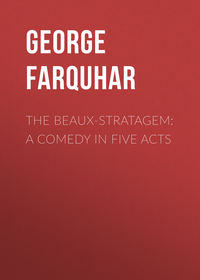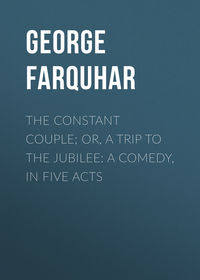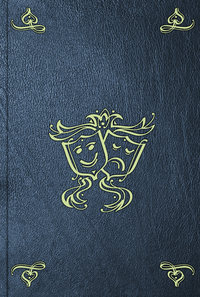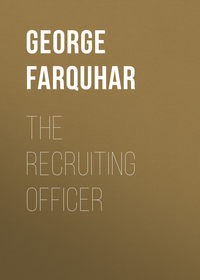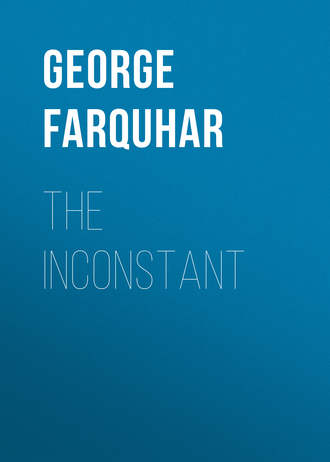 полная версия
полная версияThe Inconstant
Y. Mir. Both.
Old Mir. But which will you marry?
Y. Mir. Neither.
Old Mir. Neither! Don't make me angry now, Bob – pray, don't make me angry. – Lookye, sirrah, if I don't dance at your wedding to-morrow, I shall be very glad to cry at your grave.
Y. Mir. That's a bull, father.
Old Mir. A bull! Why, how now, ungrateful sir, did I make thee a man, that thou shouldst make me a beast?
Y. Mir. Your pardon, sir; I only meant your expression.
Old Mir. Harkye, Bob, learn better manners to your father before strangers! I won't be angry this time: But oons, if ever you do't again, you rascal! – remember what I say.[Exit.
Y. Mir. Pshaw! what does the old fellow mean by mewing me up here with a couple of green girls? – Come, Duretete, will you go?
Oriana. I hope, Mr. Mirabel, you han't forgot —
Y. Mir. No, no, madam, I han't forgot, I have brought you a thousand little Italian curiosities; I'll assure you, madam, as far as a hundred pistoles would reach, I han't forgot the least circumstance.
Oriana. Sir, you misunderstand me.
Y. Mir. Odso! the relics, madam, from Rome. I do remember, now, you made a vow of chastity before my departure; a vow of chastity, or something like it – was it not, madam?
Oriana. O sir, I'm answered at present.[Exit.
Y. Mir. She was coming full mouth upon me with her contract – 'Would I might despatch t'other!
Dur. Mirabel, that lady there, observe her, she's wondrous pretty, 'faith! and seems to have but few words; I like her mainly – speak to her, man, pr'ythee speak to her.
Y. Mir. Madam, here's a gentleman, who declares —
Dur. Madam, don't believe him, I declare nothing – What, the devil, do you mean, man?
Y. Mir. He says, madam, that you are as beautiful as an angel.
Dur. He tells a damned lie, madam! I say no such thing – Are you mad, Mirabel? Why, I shall drop down with shame.
Y. Mir. And so, madam, not doubting but your ladyship may like him as well as he does you, I think it proper to leave you together.
[Going, Duretete holds him.Dur. Hold, hold – Why, Mirabel, friend, sure you won't be so barbarous as to leave me alone! Pr'ythee, speak to her for yourself, as it were! Lord, Lord, that a Frenchman should want impudence!
Y. Mir. You look mighty demure, madam. – She's deaf, Captain.
Dur. I had much rather have her dumb.
Y. Mir. The gravity of your air, madam, promises some extraordinary fruits from your study, which moves us with curiosity to inquire the subject of your ladyship's contemplation. – Not a word!
Dur. I hope in the Lord, she's speechless! if she be, she's mine this moment. Mirabel, d'ye think a woman's silence can be natural?
Bis. But the forms which logicians introduce, and which proceed from simple enumeration, are dubitable, and proceed only upon admittance —
Y. Mir. Hoyty toyty! what a plague have we here? Plato in petticoats!
Dur. Ay, ay, let her go on, man; she talks in my own mother tongue.
Bis. 'Tis exposed to invalidity, from a contradictory instance; looks only upon common operations, and is infinite in its termination.
Y. Mir. Rare pedantry!
Dur. Axioms! axioms! self-evident principles!
Bis. Then the ideas wherewith the mind is pre-occupate. – O, gentlemen, I hope you'll pardon my cogitation! I was involved in a profound point of philosophy, but I shall discuss it somewhere else, being satisfied, that the subject is not agreeable to your sparks, that profess the vanity of the times.[Exit.
Y. Mir. Go thy way, good wife Bias! Do you hear, Duretete? Dost hear this starched piece of austerity?
Dur. She's mine, man, she's mine – My own talent to a T. – I'll match her in dialectics, 'faith! I was seven years at the university, man, nursed up with Barbaro, Celarunt, Darii, Ferio, Baralipton. Did you ever know, man, that 'twas metaphysics made me an ass? It was, 'faith! Had she talked a word of singing, dancing, plays, fashions, or the like, I had foundered at the first step; but as she is – Mirabel, wish me joy!
Y. Mir. You don't mean marriage, I hope?
Dur. No, no, I am a man of more honour.
Y. Mir. Bravely resolved, Captain! now for thy credit – warm me this frozen snowball – 'twill be a conquest above the Alps!
Dur. But will you promise to be always near me?
Y. Mir. Upon all occasions, never fear.
Dur. Why, then, you shall see me, in two moments, make an induction from my love to her hand, from her hand to her mouth, from her mouth to her heart, and so conclude in her bed, categorematice.
Y. Mir. Now the game begins, and my fool is entered. – But here comes one to spoil my sport; now shall I be teased to death, with this old-fashioned contract! I should love her too, if I might do it my own way, but she'll do nothing without witnesses, forsooth! I wonder women can be so immodest!
Enter OrianaWell, madam, why d'ye follow me?
Oriana. Well, sir, why do you shun me?
Y. Mir. 'Tis my humour, madam, and I'm naturally swayed by inclination.
Oriana. Have you forgot our contract, sir?
Y. Mir. All I remember of that contract is, that it was made some three years ago, and that's enough, in conscience, to forget the rest on't.
Oriana. 'Tis sufficient, sir, to recollect the passing of it; for, in that circumstance, I presume, lies the force of the obligation.
Y. Mir. Obligations, madam, that are forced upon the will, are no tie upon the conscience; I was a slave to my passion, when I passed the instrument, but the recovery of my freedom makes the contract void.
Oriana. Come, Mr. Mirabel, these expressions I expected from the raillery of your humour, but I hope for very different sentiments from your honour and generosity.
Y. Mir. Lookye, madam, as for my generosity, 'tis at your service, with all my heart: I'll keep you a coach and six horses, if you please, only permit me to keep my honour to myself. Consider, madam, you have no such thing among ye, and 'tis a main point of policy to keep no faith with reprobates – thou art a pretty little reprobate, and so get thee about thy business!
Oriana. Well, sir, even all this I will allow to the gaiety of your temper; your travels have improved your talent of talking, but they are not of force, I hope, to impair your morals.
Y. Mir. Morals! why, there 'tis again now! – I tell thee, child, there is not the least occasion for morals, in any business between you and I. Don't you know that, of all commerce in the world, there is no such cozenage and deceit, as in the traffic between man and woman? we study all our lives long, how to put tricks upon one another. – No fowler lays abroad more nets for his game, nor a hunter for his prey, than you do, to catch poor innocent men. – Why do you sit three or four hours at your toilet in a morning? only with a villanous design to make some poor fellow a fool before night. What d'ye sigh for? – What d'ye weep for? – What d'ye pray for? Why, for a husband: That is, you implore Providence to assist you, in the just, and pious design, of making the wisest of his creatures a fool, and the head of the creation, a slave.
Oriana. Sir, I am proud of my power, and am resolved to use it.
Y. Mir. Hold, hold, madam, not so fast – As you have variety of vanities to make coxcombs of us; so we have vows, oaths, and protestations, of all sorts and sizes, to make fools of you – And this, in short, my dear creature, is our present condition. I have sworn, and lied, briskly, to gain my ends of you; your ladyship has patched and painted violently, to gain your ends of me; but, since we are both disappointed, let us make a drawn battle, and part clear on both sides.
Oriana. With all my heart, sir! give me up my contract, and I'll never see your face again.
Y. Mir. Indeed, I won't, child!
Oriana. What, sir! neither do one nor t'other?
Y. Mir. No, you shall die a maid, unless you please to be otherwise, upon my terms.
Oriana. What do you intend by this, sir?
Y. Mir. Why, to starve you into compliance; – lookye, you shall never marry any man; and you had as good let me do you a kindness as a stranger.
Oriana. Sir, you're a —
Y. Mir. What am I, ma'am?
Oriana. A villain, sir.
Y. Mir. I'm glad on't – I never knew an honest fellow in my life, but was a villain upon these occasions. Han't you drawn yourself, now, into a very pretty dilemma? ha! ha! ha! the poor lady has made a vow of virginity, when she thought of making a vow to the contrary. Was ever poor woman so cheated into chastity?
Oriana. Sir, my fortune is equal to yours, my friends as powerful, and both shall be put to the test, to do me justice.
Y. Mir. What! you'll force me to marry you, will ye?
Oriana. Sir, the law shall.
Y. Mir. But the law can't force me to do any thing else, can it?
Oriana. Pshaw, I despise thee – Monster!
Y. Mir. Kiss and be friends, then – Don't cry, child, and you shall have your sugar plumb – Come, madam, d'ye think I could be so unreasonable as to make you fast all your life long! No, I did but jest, you shall have your liberty – here, take your contract, and give me mine.
Oriana. No, I won't.
Y. Mir. Eh! What, is the girl a fool?
Oriana. No, sir, you shall find me cunning enough to do myself justice; and since I must not depend upon your love, I'll be revenged, and force you to marry me, out of spite.
Y. Mir. Then I'll beat thee out of spite, and make a most confounded husband!
Oriana. O, sir, I shall match ye! A good husband makes a good wife at any time.
Y. Mir. I'll rattle down your china about your ears.
Oriana. And I'll rattle about the city, to run you in debt for more.
Y. Mir. I'll tear the furbelow off your clothes, and when you swoon for vexation, you shan't have a penny, to buy a bottle of hartshorn.
Oriana. And you, sir, shall have hartshorn in abundance.
Y. Mir. I'll keep as many mistresses as I have coach horses.
Oriana. And I'll keep as many gallants as you have grooms.
Y. Mir. But, sweet madam, there is such a thing as a divorce!
Oriana. But, sweet sir, there is such a thing as alimony! so divorce on, and spare not.[Exit.
Y. Mir. Ay, that separate maintenance is the devil – there's their refuge! – O' my conscience, one would take cuckoldom for a meritorious action, because the women are so handsomely rewarded for it.[Exit.
Enter Duretete and PetitDur. And she's mighty peevish, you say?
Petit. O sir, she has a tongue as long as my leg, and talks so crabbedly, you would think she always spoke Welsh.
Dur. That's an odd language, methinks, for her philosophy.
Petit. But sometimes she will sit you half a day without speaking a word, and talk oracles all the while by the wrinkles of her forehead, and the motions of her eyebrows.
Dur. Nay, I shall match her in philosophical ogles, 'faith! – that's my talent: I can talk best, you must know, when I say nothing.
Petit. But d'ye ever laugh, sir?
Dur. Laugh? Won't she endure laughing?
Petit. Why, she's a critic, sir, she hates a jest, for fear it should please her; and nothing keeps her in humour, but what gives her the spleen. – And then, for logic, and all that, you know —
Dur. Ay, ay, I'm prepared, I have been practising hard words and no sense, this hour, to entertain her.
Petit. Then place yourself behind this screen, that you may have a view of her behaviour before you begin.
Dur. I long to engage her, lest I should forget my lesson.
Petit. Here she comes, sir – I must fly.
[Exit Petit, and Duretete stands peeping behind the Curtain. Enter Bisarre and MaidBis. [With a Book.] Pshaw! hang books! they sour our temper, spoil our eyes, and ruin our complexions.
[Throws away the Book.Dur. Eh? the devil such a word there is in all Aristotle!
Bis. Come, wench, let's be free – call in the fiddle, there's nobody near us.
Dur. 'Would to the Lord there was not!
Bis. Here, friend, a minuet – [Music.] Quicker time – ha – 'would we had a man or two!
Dur. [Stealing away.] You shall have the devil sooner, my dear, dancing philosopher!
Bis. Uds my life! – Here's one!
[Runs to Duretete, and hales him back.Dur. Is all my learned preparation come to this?
Bis. Come, sir, don't be ashamed, that's my good boy – you're very welcome, we wanted such a one – Come, strike up – [Dance.] I know you dance well, sir, you're finely shaped for't – Come, come, sir; – quick, quick! you miss the time else.
Dur. But, madam, I come to talk with you.
Bis. Ay, ay, talk as you dance, talk as you dance, – come.
Dur. But we were talking of dialectics —
Bis. Hang dialectics! [Music.] Mind the time – quicker, sirrah! – Come – and how d'ye find yourself now, sir?
Dur. In a fine breathing sweat, Doctor.
Bis. All the better, patient, all the better; – Come, sir, sing now, sing, I know you sing well: I see you have a singing face – a heavy, dull, sonata face.
Dur. Who, I sing?
Bis. O you're modest, sir – but come, sit down closer – closer. Here, a bottle of wine! [Exit Maid, and returns with Wine.] Come, sir – sing, sir.
Dur. But, madam, I came to talk with you.
Bis. O sir, you shall drink first. – Come, fill me a bumper – here, sir, bless the king!
Dur. 'Would I were out of his dominions! – By this light, she'll make me drunk too!
Bis. O pardon me, sir, you shall do me right – fill it higher. – Now, sir, can you drink a health under your leg?
Dur. Rare philosophy that, 'faith!
Bis. Come, off with it to the bottom! – Now, how d'ye like me, sir?
Dur. O, mighty well, madam!
Bis. You see how a woman's fancy varies! sometimes, splenetic and heavy, then, gay and frolicsome. – And how d'ye like the humour?
Dur. Good madam, let me sit down to answer you, for I am heartily tired.
Bis. Fie upon't! a young man, and tired! up, for shame, and walk about! – Action becomes us – a little faster, sir – What d'ye think now of my Lady La Pale, and Lady Coquet, the duke's fair daughter? Ha! Are they not brisk lasses? Then there is black Mrs. Bellair, and brown Mrs. Bellface!
Dur. They are all strangers to me, madam.
Bis. But let me tell you, sir, that brown is not always despicable – O Lard, sir, if young Mrs. Bagatell had kept herself single till this time o'day, what a beauty there had been! And then, you know, the charming Mrs. Monkeylove, the fair gem of St. Germain's!
Dur. Upon my soul, I don't!
Bis. And then, you must have heard of the English beau, Spleenamore, how unlike a gentleman —
Dur. Hey! – not a syllable on't, as I hope to be saved, madam!
Bis. No! Why, then, play me a jig; – [Music.] – Come, sir.
Dur. By this light, I cannot! 'faith, madam, I have sprained my leg!
Bis. Then sit you down, sir; – and now tell me what's your business with me? What's your errand? Quick, quick, despatch! – Odso, may be, you are some gentleman's servant, that has brought me a letter, or a haunch of venison?
Dur. 'Sdeath, madam, do I look like a carrier?
Bis. O, cry you mercy, I saw you just now, I mistook you, upon my word! you are one of the travelling gentlemen – and pray, sir, how do all our impudent friends in Italy?
Dur. Madam, I came to wait on you with a more serious intention than your entertainment has answered.
Bis. Sir, your intention of waiting on me was the greatest affront imaginable, however your expressions may turn it to a compliment: Your visit, sir, was intended as a prologue to a very scurvy play, of which, Mr. Mirabel and you so handsomely laid the plot. – "Marry! No, no, I am a man of more honour." – Where's your honour? Where's your courage now? Ads my life, sir, I have a great mind to kick you! – Go, go to your fellow-rake now, rail at my sex, and get drunk for vexation, and write a lampoon – But I must have you to know, sir, that my reputation is above the scandal of a libel, my virtue is sufficiently approved to those whose opinion is my interest: and, for the rest, let them talk what they will; for, when I please, I'll be what I please, in spite of you and all mankind; and so, my dear man of honour, if you be tired, con over this lesson, and sit there till I come to you.[Runs off.
Dur. Tum ti dum. [Sings.] Ha! ha! ha! "Ad's my life, I have a great mind to kick you!" – Oons and confusion! [Starts up.] Was ever man so abused! – Ay, Mirabel set me on.
Enter Petit.Petit. Well, sir, how d'ye find yourself?
Dur. You son of a nine-eyed whore, d'ye come to abuse me? I'll kick you with a vengeance, you dog!
[Petit runs off, and Duretete after him.ACT THE THIRD
SCENE I
Old Mirabel's House Enter Old and Young Mirabel, meetingOld Mir. Bob, come hither, Bob.
Y. Mir. Your pleasure, sir?
Old Mir. Are not you a great rogue, sirrah?
Y. Mir. That's a little out of my comprehension, sir; for I've heard say, that I resemble my father.
Old Mir. Your father is your very humble slave – I tell thee what, child, thou art a very pretty fellow, and I love thee heartily; and a very great villain, and I hate thee mortally.
Y. Mir. Villain, sir! Then I must be a very impudent one; for I can't recollect any passage of my life that I'm ashamed of.
Old Mir. Come hither, my dear friend; dost see this picture?
[Shows him a little Picture.Y. Mir. Oriana's? Pshaw!
Old Mir. What, sir, won't you look upon't? – Bob, dear Bob, pr'ythee come hither now – Dost want any money, child?
Y. Mir. No, sir.
Old Mir. Why, then, here's some for thee: come here now – How canst thou be so hard-hearted, an unnatural, unmannerly rascal, (don't mistake me, child, I a'n't angry) as to abuse this tender, lovely, good-natured, dear rogue? – Why, she sighs for thee, and cries for thee, pouts for thee, and snubs for thee; the poor little heart of it is like to burst – Come, my dear boy, be good-natured, like your own father; be now – and then, see here, read this – the effigies of the lovely Oriana, with thirty thousand pound to her portion – thirty thousand pound, you dog! thirty thousand pound, you rogue! how dare you refuse a lady with thirty thousand pound, you impudent rascal?
Y. Mir. Will you hear me speak, sir?
Old Mir. Hear you speak, sir! If you had thirty thousand tongues, you could not out-talk thirty thousand pound, sir.
Y. Mir. Nay, sir, if you won't hear me, I'll begone, sir! I'll take post for Italy this moment.
Old Mir. Ah, the fellow knows I won't part with him! Well, sir, what have you to say?
Y. Mir. The universal reception, sir, that marriage has had in the world, is enough to fix it for a public good, and to draw every body into the common cause; but there are some constitutions, like some instruments, so peculiarly singular, that they make tolerable music by themselves, but never do well in a concert.
Old Mir. Why, this is reason, I must confess, but yet it is nonsense too; for, though you should reason like an angel, if you argue yourself out of a good estate, you talk like a fool.
Y. Mir. But, sir, if you bribe me into bondage with the riches of Crœsus, you leave me but a beggar, for want of my liberty.
Old Mir. Was ever such a perverse fool heard? 'Sdeath, sir! why did I give you education? was it to dispute me out of my senses? Of what colour, now, is the head of this cane? You'll say, 'tis white, and, ten to one, make me believe it too – I thought that young fellows studied to get money.
Y. Mir. No, sir, I have studied to despise it; my reading was not to make me rich, but happy, sir.
Old Mir. There he has me again, now! But, sir, did not I marry to oblige you?
Y. Mir. To oblige me, sir! in what respect, pray?
Old Mir. Why, to bring you into the world, sir; wa'n't that an obligation?
Y. Mir. And, because I would have it still an obligation, I avoid marriage.
Old Mir. How is that, sir?
Y. Mir. Because I would not curse the hour I was born.
Old Mir. Lookye, friend, you may persuade me out of my designs, but I'll command you out of yours; and, though you may convince my reason that you are in the right, yet there is an old attendant of sixty-three, called positiveness, which you, nor all the wits in Italy, shall ever be able to shake: so, sir, you're a wit, and I'm a father: you may talk, but I'll be obeyed.
Y. Mir. This it is to have the son a finer gentleman than the father; they first give us breeding, that they don't understand; then they turn us out of doors, because we are wiser than themselves. But I'm a little aforehand with the old gentleman. [Aside.] Sir, you have been pleased to settle a thousand pound sterling a year upon me; in return of which, I have a very great honour for you and your family, and shall take care that your only and beloved son shall do nothing to make him hate his father, or to hang himself. So, dear sir, I'm your very humble servant.[Runs off.
Old Mir. Here, sirrah! rogue! Bob! villain!
Enter DugardDug. Ah, sir! 'tis but what he deserves.
Old Mir. 'Tis false, sir! he don't deserve it: what have you to say against my boy, sir?
Dug. I shall only repeat your own words.
Old Mir. What have you to do with my words? I have swallowed my words already; I have eaten them up. – I say, that Bob's an honest fellow, and who dares deny it?
Enter BisarreBis. That dare I, sir: – I say, that your son is a wild, foppish, whimsical, impertinent coxcomb; and, were I abused, as this gentleman's sister is, I would make it an Italian quarrel, and poison the whole family.
Dug. Come, sir, 'tis no time for trifling: my sister is abused; you are made sensible of the affront, and your honour is concerned to see her redressed.
Old Mir. Lookye, Mr. Dugard, good words go farthest. I will do your sister justice, but it must be after my own rate; nobody must abuse my son but myself; for, although Robin be a sad dog, yet he's nobody's puppy but my own.
Bis. Ay, that's my sweet-natured, kind, old gentleman – [Wheedling him.] We will be good, then, if you'll join with us in the plot.
Old Mir. Ah, you coaxing young baggage! what plot can you have to wheedle a fellow of sixty-three?
Bis. A plot that sixty-three is only good for; to bring other people together, sir. You must act the Spaniard, because your son will least suspect you; and, if he should, your authority protects you from a quarrel, to which Oriana is unwilling to expose her brother.
Old Mir. And what part will you act in the business, madam?
Bis. Myself, sir; my friend is grown a perfect changeling: these foolish hearts of ours spoil our heads presently; the fellows no sooner turn knaves, but we turn fools: but I am still myself, and he may expect the most severe usage from me, because I neither love him, nor hate him.[Exit.


